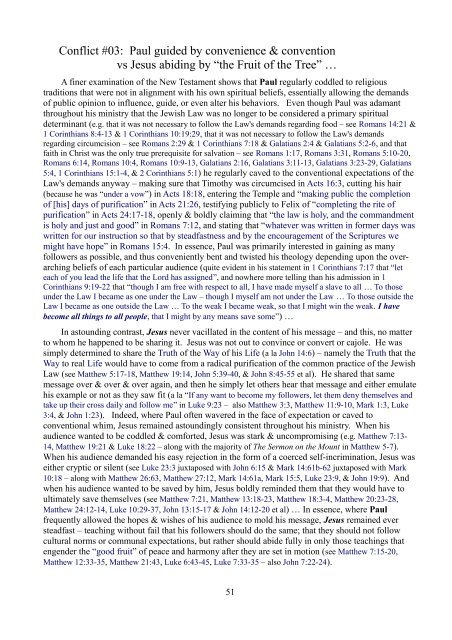The Cult of Paul
an exhaustive biblical examination of the starkly contrasting lives, values, & theologies of Jesus Christ and Paul -- Jesus' most zealous “apostle,” and the true father of the modern-day Christian church
an exhaustive biblical examination of the starkly contrasting lives, values, & theologies of Jesus Christ and Paul -- Jesus' most zealous “apostle,” and the true father of the modern-day Christian church
Create successful ePaper yourself
Turn your PDF publications into a flip-book with our unique Google optimized e-Paper software.
Conflict #03: <strong>Paul</strong> guided by convenience & convention<br />
vs Jesus abiding by “the Fruit <strong>of</strong> the Tree” …<br />
A finer examination <strong>of</strong> the New Testament shows that <strong>Paul</strong> regularly coddled to religious<br />
traditions that were not in alignment with his own spiritual beliefs, essentially allowing the demands<br />
<strong>of</strong> public opinion to influence, guide, or even alter his behaviors. Even though <strong>Paul</strong> was adamant<br />
throughout his ministry that the Jewish Law was no longer to be considered a primary spiritual<br />
determinant (e.g. that it was not necessary to follow the Law's demands regarding food – see Romans 14:21 &<br />
1 Corinthians 8:4-13 & 1 Corinthians 10:19:29, that it was not necessary to follow the Law's demands<br />
regarding circumcision – see Romans 2:29 & 1 Corinthians 7:18 & Galatians 2:4 & Galatians 5:2-6, and that<br />
faith in Christ was the only true prerequisite for salvation – see Romans 1:17, Romans 3:31, Romans 5:10-20,<br />
Romans 6:14, Romans 10:4, Romans 10:9-13, Galatians 2:16, Galatians 3:11-13, Galatians 3:23-29, Galatians<br />
5:4, 1 Corinthians 15:1-4, & 2 Corinthians 5:1) he regularly caved to the conventional expectations <strong>of</strong> the<br />
Law's demands anyway – making sure that Timothy was circumcised in Acts 16:3, cutting his hair<br />
(because he was “under a vow”) in Acts 18:18, entering the Temple and “making public the completion<br />
<strong>of</strong> [his] days <strong>of</strong> purification” in Acts 21:26, testifying publicly to Felix <strong>of</strong> “completing the rite <strong>of</strong><br />
purification” in Acts 24:17-18, openly & boldly claiming that “the law is holy, and the commandment<br />
is holy and just and good” in Romans 7:12, and stating that “whatever was written in former days was<br />
written for our instruction so that by steadfastness and by the encouragement <strong>of</strong> the Scriptures we<br />
might have hope” in Romans 15:4. In essence, <strong>Paul</strong> was primarily interested in gaining as many<br />
followers as possible, and thus conveniently bent and twisted his theology depending upon the overarching<br />
beliefs <strong>of</strong> each particular audience (quite evident in his statement in 1 Corinthians 7:17 that “let<br />
each <strong>of</strong> you lead the life that the Lord has assigned”, and nowhere more telling than his admission in 1<br />
Corinthians 9:19-22 that “though I am free with respect to all, I have made myself a slave to all … To those<br />
under the Law I became as one under the Law – though I myself am not under the Law … To those outside the<br />
Law I became as one outside the Law … To the weak I became weak, so that I might win the weak. I have<br />
become all things to all people, that I might by any means save some”) …<br />
In astounding contrast, Jesus never vacillated in the content <strong>of</strong> his message – and this, no matter<br />
to whom he happened to be sharing it. Jesus was not out to convince or convert or cajole. He was<br />
simply determined to share the Truth <strong>of</strong> the Way <strong>of</strong> his Life (a la John 14:6) – namely the Truth that the<br />
Way to real Life would have to come from a radical purification <strong>of</strong> the common practice <strong>of</strong> the Jewish<br />
Law (see Matthew 5:17-18, Matthew 19:14, John 5:39-40, & John 8:45-55 et al). He shared that same<br />
message over & over & over again, and then he simply let others hear that message and either emulate<br />
his example or not as they saw fit (a la “If any want to become my followers, let them deny themselves and<br />
take up their cross daily and follow me” in Luke 9:23 – also Matthew 3:3, Matthew 11:9-10, Mark 1:3, Luke<br />
3:4, & John 1:23). Indeed, where <strong>Paul</strong> <strong>of</strong>ten wavered in the face <strong>of</strong> expectation or caved to<br />
conventional whim, Jesus remained astoundingly consistent throughout his ministry. When his<br />
audience wanted to be coddled & comforted, Jesus was stark & uncompromising (e.g. Matthew 7:13-<br />
14, Matthew 19:21 & Luke 18:22 – along with the majority <strong>of</strong> <strong>The</strong> Sermon on the Mount in Matthew 5-7).<br />
When his audience demanded his easy rejection in the form <strong>of</strong> a coerced self-incrimination, Jesus was<br />
either cryptic or silent (see Luke 23:3 juxtaposed with John 6:15 & Mark 14:61b-62 juxtaposed with Mark<br />
10:18 – along with Matthew 26:63, Matthew 27:12, Mark 14:61a, Mark 15:5, Luke 23:9, & John 19:9). And<br />
when his audience wanted to be saved by him, Jesus boldly reminded them that they would have to<br />
ultimately save themselves (see Matthew 7:21, Matthew 13:18-23, Matthew 18:3-4, Matthew 20:23-28,<br />
Matthew 24:12-14, Luke 10:29-37, John 13:15-17 & John 14:12-20 et al) … In essence, where <strong>Paul</strong><br />
frequently allowed the hopes & wishes <strong>of</strong> his audience to mold his message, Jesus remained ever<br />
steadfast – teaching without fail that his followers should do the same; that they should not follow<br />
cultural norms or communal expectations, but rather should abide fully in only those teachings that<br />
engender the “good fruit” <strong>of</strong> peace and harmony after they are set in motion (see Matthew 7:15-20,<br />
Matthew 12:33-35, Matthew 21:43, Luke 6:43-45, Luke 7:33-35 – also John 7:22-24).<br />
51

















